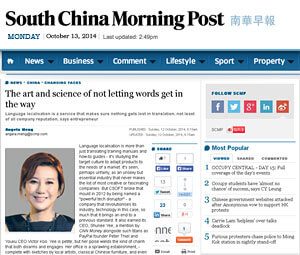2014年10月13日
Language localization is a service that makes sure nothing gets lost in translation, not least of all company reputation, says entrepreneur

Why did you choose China?
Whether companies are selling products worldwide, or opening a new factory, there is an intersection between technology transfer and language. This is a new era of global communications; it’s about excelling in global trade. Traditionally all those global communications companies are centred in the US or Europe. We chose China, strategically, to be headquartered. We know it’s challenging, because of intellectual property and other issues. We are a new challenger, like being the first generation of global communications companies. Most Fortune 500 companies have products released worldwide, but in the last couple of years, we’ve seen a new rise in Chinese companies going global. That’s where we saw a potential for growth. In our early days, we also saw that China had a very large talent pool that we could tap. We decided not to join the price war. I remember the only big Chinese company we served in the early days; they were selling their products in Japan. They came to us and asked: “This is just translation, why is it so expensive?” We said we don’t do just penny translations over the table; we want to localize your products. So they left and came back a few months later, and paid us the exact price we asked for. The demand for localization has grown so quickly in the past few years. We serve Huawei, Beijing Automotive and a dozen large local companies here.
What makes this industry so special for you?
Translation is hundreds of years old. If you look at the global economy, people are launching global businesses by launching their products, or building their factories, or striking a cross-border deal. The space that we are in is the intersection of language and technology, because when you are sending language to a different market, you have to ask not only how the language can be transferred, but also how the company can comply with local policies. I always ask my typical Chinese customer: “Are you handling your language properly, effectively, in your global launch?” Our Chinese customers do not consider language a part of their product. Chinese are frustrated over why their products are considered cheap. I told them it’s because your language is not there; the installation guide is not there; people don’t understand your product. There are also a legal impact as well as regulatory requirements. Chinese customers often fail on this. This is what we call localization: it is beyond just words; it is local insight and how we present something. We handle more than 100 different languages. But we use proper words images that do not offend anyone.
Click here to read the full article.
About CSOFT Health Sciences
CSOFT Health Sciences, leaders in clinical trial localization, provides AI/ML-enabled medical translation services for all phases of the drug and medical device product lifecycle, from development to post-launch. We also specialize in DCT solutions, linguistic validation, and CTD/eCTD submissions with the FDA, EMA, and NMPA. Our operations are certified in ISO 17100:2015, ISO 9001:2015, and ISO 13485:2016, ensuring our customized solutions meet the rigorous regulatory requirements of MMA, NDA, CTA, and Medical Device Application submissions. www.csoftintl.com
Media Contacts
Nikki Andrews (U.S./Europe)
